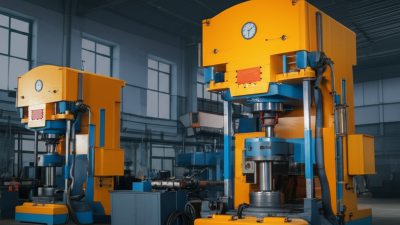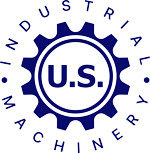Setting New Industry Standards: The Rise of the Best Industrial Press for Global Buyers
In recent years, the industrial press market has experienced significant transformations, setting new benchmarks for quality and efficiency that cater to the evolving needs of global buyers. According to a recent report by Research and Markets, the global industrial press market is projected to reach $XX billion by 2025, with a compound annual growth rate (CAGR) of XX%. This surge underscores the increasing demand for innovative solutions that enhance productivity and reduce operational costs. As manufacturers adopt advanced technologies such as automation and AI, the quest for the best industrial press becomes paramount.
 In this context, exploring alternatives to traditional models not only offers buyers broader options but also propels the industry towards more sustainable practices. This blog will delve into the rise of alternative industrial presses and their impact on establishing new industry standards.
In this context, exploring alternatives to traditional models not only offers buyers broader options but also propels the industry towards more sustainable practices. This blog will delve into the rise of alternative industrial presses and their impact on establishing new industry standards.
Understanding the Importance of Quality Suppliers in Industry Standards
In the rapidly evolving industrial landscape, the importance of sourcing from quality suppliers has never been more pronounced. As global buyers seek to enhance their competitiveness, the necessity to adhere to stringent industry standards draws attention to the suppliers' role in this equation. Quality suppliers not only ensure consistent product performance but also contribute to overall supply chain resilience, helping businesses navigate the complexities of modern manufacturing.
Moreover, establishing a solid partnership with reputable suppliers is crucial for innovation and sustainability. As industries push towards adopting environmentally friendly practices and cutting-edge technologies, suppliers with proven track records in quality and compliance become invaluable allies. Their expertise can help businesses align with emerging standards while fostering a culture of excellence in product development. By prioritizing the selection of high-quality suppliers, companies can effectively meet market demands and set new benchmarks within their respective industries.
Key Attributes to Evaluate When Choosing an Industrial Press Supplier
When selecting an industrial press supplier, it's essential to evaluate key attributes that ensure the supplier aligns with your operational needs. First, consider the supplier’s experience and reputation in the industry. A company with a strong track record is more likely to provide reliable products that meet safety and performance standards. Additionally, investigate their customer service. A supplier that is responsive and willing to assist you with technical support can make a significant difference in your overall experience.
Another important factor is the range of products offered. Look for suppliers that provide various types of industrial presses, which can cater to different applications. This versatility not only helps in meeting immediate needs but also allows for future scalability as your business grows.
**Tips:** When evaluating suppliers, request case studies or references from existing clients to gauge their satisfaction. Additionally, always check for certifications that demonstrate adherence to industry standards. This ensures that you're making a well-informed decision and investing in quality equipment that will stand the test of time.
Top Strategies for Effective Supplier Communication and Relationship Building
Setting new industry standards in supplier communication and relationship building is essential for companies navigating the complexities of today's global supply chains. As globalization deepens, suppliers and manufacturers face a web of interdependencies that require robust communication strategies. According to the latest reports, effective supply chain management is not just about optimization; it involves fostering strong relationships with suppliers to enhance agility and responsiveness.
1. Regular Check-ins: Schedule consistent meetings with suppliers to address concerns proactively and maintain alignment on expectations.
2. Transparency: Sharing relevant data regarding market trends and production schedules can help build trust and facilitate better decision-making.
In a rapidly evolving market, particularly in the electric and intelligent vehicle sectors, the ability to adapt supply chain strategies is vital. Companies must implement flexible strategies that allow them to respond to shifting demands and technological advancements swiftly. Research indicates that enhancing supply chain flexibility can significantly improve operational performance, enabling firms to meet customer needs more effectively.
1. Collaborative Problem-Solving: Involve suppliers in discussions around challenges and solutions to strengthen partnerships and foster innovation.
2. Mutual Goals: Work with suppliers to establish shared objectives that align with both parties' strategic interests for better collaboration.
Harnessing Technology to Identify and Vet Potential Suppliers
In the evolving landscape of global trade, the ability to effectively identify and vet potential suppliers has become paramount for industrial buyers. As companies increasingly embrace technology, innovative platforms are emerging to streamline the supplier selection process. These advancements not only enhance efficiency but also drive sustainability initiatives, aligning purchasing decisions with broader environmental goals. By leveraging data analytics and AI, businesses can assess supplier capabilities and compliance with industry standards, ensuring a reliable and responsible procurement strategy.
Moreover, initiatives like the First Movers Coalition illustrate the impactful role of purchasing power in spearheading decarbonization efforts. By committing to support breakthrough technologies in industries that are traditionally hard to decarbonize, companies are not only fostering innovation but also creating a robust demand for sustainable solutions. This shift towards responsible sourcing is critical as global buyers increasingly prioritize environmental considerations in their supply chain decisions, setting new industry standards and cultivating a more sustainable future for all.
Best Practices for Negotiating Terms and Pricing with Suppliers
Negotiating terms and pricing with suppliers is a critical skill for global buyers seeking to establish and maintain lucrative partnerships. To begin with, thorough research is essential. Understanding the supplier's market position, production costs, and benchmark pricing across the industry provides a solid foundation for negotiation. It enables buyers to craft informed proposals that are both competitive and realistic, allowing them to secure favorable terms without compromising quality or reliability.
Effective communication plays a vital role in successful negotiations. Establishing a rapport with suppliers fosters an atmosphere of trust and cooperation. This approach often leads to more transparent discussions about pricing structures and potential discounts. Buyers should be clear about their expectations while also being open to feedback. By using active listening techniques, they can address the suppliers’ concerns or limitations, which can lead to creative solutions that benefit both parties, such as volume discounts or flexible payment terms that enhance long-term relationships and stability.
